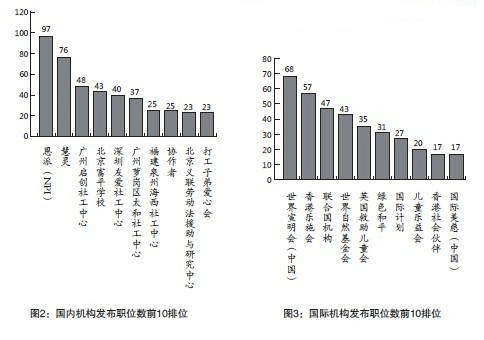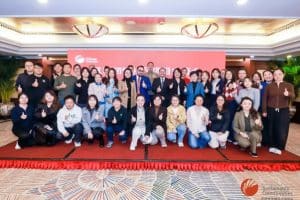Introduction: The following article is a very interesting and valuable analysis of changes in NGO staff recruitment using data from CDB’s job posting service which is widely regarded as one of the most comprehensive, if not the most comprehensive, in the public interest sector. As the authors show, the numbers provide further confirmation of the growth, mainstreaming and professionalization of the NGO sector, particularly when compared with a similar statistical analysis that China Development Brief carried out in 2005.
In recent years, the public interest sector has entered a rapid period of development. [Editor’s Note: As in all of our translations, the term “public interest” is used synonymously with “philanthropy”, “charity”, “non-profit” and NGO.] An analysis of the human resource needs of NGOs can reveal useful findings. For this report, we compiled, summarized, and analyzed all NGO recruitment ads posted on the China Development Brief website (www.cdb.org.cn) over a one-year period (August 1st, 2010 to July 31st, 2011). The positions advertised come from domestic and international NGOs, foundations, the United Nations and multilateral aid groups, bilateral aid groups, in-house corporate social responsibility (CSR) positions in private enterprises, and CSR consulting agencies.
First, we would like to provide a note on our methods. Because of recruitment challenges and/or high job-turnover rates, a few organizations posted advertisements for the same vacancy multiple times. In our analysis, we exclude duplicate vacancy advertisements. Also, job posts found on the CDB website and on similar public philanthropy platforms only represent a figurative “drop in the sea.” Thus, this report only reflects a tiny facet of total demand for human resources in the public philanthropy sector. In the future, we would like to carry out statistical analysis of web-based data at regular intervals, with the goal of providing a useful reflection of the public sector’s development.
The “Rise” of Domestic Organizations
Of the 2,133 vacancies posted, domestic organizations accounted for more than two-thirds of the total, a somewhat unexpected finding. Back in 2005, when CDB conducted its first-ever analysis of job postings on its website over a three year period (2002-2005), international organizations dominated, with very few domestic groups posting vacancy ads. (You can view a Chinese version of the article here).

Now, more and more domestic organizations are using an open recruitment process. This not only reflects the growth in the number of domestic organizations, but also demonstrates a definitive change in their management of human resources. Even a few government-backed foundations, which previously had very little engagement with CDB, have started to use CDB’s website to post job vacancies. These organizations are now using more open recruitment channels, moving away from the old, closed-door process in which posts were filled by candidates recommended from within a small group. Looking at the situation now, there are three times as many job-postings in 2010-2011 as there were in 2002-2005, a clear sign of the nonprofit sector’s growth.
This year, the aggregate number of jobs posted by the ten domestic organizations most active in recruiting (437) surpassed that of the top ten most active international organizations (362). This suggests that the demand by domestic organizations for human resources has risen. It is also worth noting that of the ten most active domestic institutions, four are social work organizations. Three of the four social work organizations are based in Guangzhou and Shenzhen, two cities where local governments have expanded funding, streamlined registration procedures and introduced local policies to encourage the development of social work agencies. In addition, it should be noted that job posts for the top two NGOs—Non-Profit Incubator (恩派NPI) and Huiling (慧灵)—are not limited to Beijing, as they have positions in other parts of the country.

Of course, the top ten international organizations, including World Vision (宣明会) and Oxfam Hong Kong (香港乐施会), also have vacancies in multiple locations, including both local offices and project sites.
Comparing domestic and international organizations, we find that the former account for 6 of the top 10 most active recruiting organizations, and that they also occupy the top two spots.

Where NGOs Like to CongregateIt is not difficult to imagine, that when it comes to job availability, Beijing tops the list. Beijing still holds the advantage as a place to advocate for policies and communicate with those both outside and within China. Beijing’s NGO job market is the largest, and highly suitable for open recruitment.

Outside of Beijing, out of the dozens of provinces and cities, Guangdong, Shanghai, and Shenzhen take the next three spots. These economically developed coastal areas are also known for more innovative management and a more liberal environment for experimentation. The magnetic pull and open nature of these cities encourages the development of local organizations and attracts organizations from other provinces to register and carry out projects there.
Yunnan and Sichuan remain well-established destinations for NGOs, providing over a hundred new job positions. As relatively underdeveloped, inland provinces, Sichuan and Yunnan have a long history of producing and nurturing NGOs in a range of fields. The 2008 Sichuan earthquake led to the creation of multiple disaster relief and reconstruction organizations, while the 2011 Yunnan Yingjiang earthquake triggered coordinated NGO rescue responses. Three years later, the organizations still active in the former disaster zones are starting to realize the need to work together for the purpose of creating long-term reserves of experience and capacity in disaster relief.
Meanwhile, the nine overseas job postings, while a small number, could be a sign of greater change. These international development positions, directed specifically towards Chinese nationals, indicate recognition of the potential and value of the Chinese workforce. In the vast majority of cases, these vacancies have been posted by international organizations. The fact that Chinese candidates are now being targeted for international posts does not necessarily imply that China has successful development experiences that should be replicated internationally, nor does it necessarily imply that Chinese NGOs are shifting to a more global focus. Instead, the primary reason for the appearance of these international job postings lies in China’s emergence as a country with growing international influence. International organizations increasingly need to understand important Chinese figures that are working at a transnational level, such as those working in cross-regional cooperation on human trafficking or eco-conservation issues. The second reason for these job listings is that, after many years of working in China, international development groups have cultivated a corps of Chinese with international perspectives and familiarity with international organizations. Finally, Chinese businesses are also being targeted by development organizations as an important source of funding.
There are also more subtle changes taking place related to China’s growing internationalization. Compassion for Migrant Children (CMC, 打工子弟爱心会), in February 2011, posted a job on the CDB website seeking a manager for a program establishing community centeres in Nepal and Bangladesh. CMC was created by an American named Jonathan Hursh. Headquartered in China, this organization seeks to build community centeres to provide services for migrant children, youth, and the community. Up to now, it has established community centeres for migrant workers in several Beijing districts in addition to a community centere in Shanghai’s Minhang District. It is currently hoping to apply its China experience to Nepal and Bangladesh in the form of a Chinese outreach program. In the spring of 2011, CDB reported that the UK Volunteer Service Overseas (VSO) organization was recruiting its first batch of Chinese volunteers to work in Africa. It is also reported that the China Foundation for Poverty Alleviation (中国扶贫基金会) will recruit 8-10 medical volunteers to improve maternal and child health in the Sudan, borrowing from its own 10-year domestic program on maternal and child health.
Even Good Wine Needs to be Advertised
In December 2010, Horizon (零点集团) released a report titled “An Investigation on the Development and Needs of China’s Public Interest Workforce” 《中国公益人才发展现状及需求调研报告》.The report divided NGO job postings into three categories: The first consists of developmental posts, including public relations, fundraising, and research. Those posts are not directly related to project implementation, but are critical to ensuring their sustainable development. The second category consists of operational posts (e.g. project operation and implementation). The third category involves finance, administration, and IT support, which provide a foundation for the organization’s management and operations. This categorization of posts aids in the understanding of how NGOs prioritize their various functions.
The CDB statistics reveal over 1,505 job posts falling in the operational category, which ranks first overall and represents over 70 percent of the total postings. Meanwhile, administrative, finance, human resources, and various other support positions were second, at 305 postings or 14 percent of the total. Support staff are needed once organizations reach a certain size.
It is also worth noting that the public relations category included 141 job postings, coming in third. The last few years have seen NGOs placing greater importance on this function. This trend is likely related to the growing popularity of public interest issues, as well as the influence of the corporate sector. As domestic funding grows, and the public and media become more interested in public interest causes, an organization’s brand name becomes increasingly important. Transparency and brand name, and not small-scale internal evaluations, are now important considerations when fundraising.
The public interest sector has also been influenced by business principles. Some organizations even give corporate-sounding names to their positions, like “Sales and Brand Promotion,” highlighting the importance of brand-name construction. For example, Shanghai Cherished Dream Foundation (上海真爱梦想基金会) is a group guided by corporate principles. This organization groups IT, fundraising, and public relations functions together, has sales and brand management positions, and combines media relations, monitoring, internet management and sales, public brand promotion and fundraising into a single body. In April of 2010, the Cherished Dream Foundation pioneered a technique common to publicly-held companies, releasing an annual report and accepting supervision from the public and donors. This is an example of the effective application of corporate practices to the public interest field.
The Guizhou Pensioners for Rural Development Foundation (贵州薪火乡村发展基金会) was co-founded by entrepreneurs and professionals out of concern for rural education, folk culture, and health. In April, they posted positions for Brand and IT Managers responsible for external communication, media relations, crisis response, as well as internet, blog and micro-blog (Weibo) site management. Under NPI, the Shanghai-based NGO, the Shanghai United Foundation is in the process of recruiting a Resource Development Manager, who will also be responsible for fundraising and promoting brand image. In fact, advocacy organizations with a long history, like Greenpeace, have long had full-time staff with media experience who are responsible for public relations. In addition, they have also used internet-based approaches to pressure certain companies. Meanwhile, domestic organizations have only recently begun to stress the importance of external communications. The Chinese have a saying that “bars serving good wine can be located in inconvenient locations,” but they also have a saying that “even the best wine needs some advertising.”
Professional Specialization and Internship Alternatives
The development of NGOs has also seen a trend towards specialization and professionalization. The operational, support, and development positions described above are being further broken down, driving the increasingly specific demands in the job market for professional talent. Wide ranging positions in legal defense, micro-finance, investment, social work and psychological services, environmental protection, IT support, and finance and accounting embody how NGOs are increasing looking for candidates with specialized educational backgrounds.
Meanwhile, a few grassroots organizations are lacking in both human resources and financing. They make up for this through open recruitment of interns and volunteers, entrusting them with substantial responsibilities and a variety of complex functions. These organizations are able to attract talent, not through monetary compensation, but by providing meaningful work experience.
For Grassroots Organizations, The Internet is an Opportunity
In addition to traditional media, information dissemination has found other outlets in micro-blogging and blogs. So long as they invest time and energy in understanding internet-based forms of media, organizations—whether or not they have financial resources—can stand on equal footing. Several organizations have singled out these prominent positions and have assigned employees to write blogs and use online social-networking platforms. This represents an opportunity for grassroots organizations.
Take IT, for example, which is a technical job. The primary responsibilities for those in IT are site maintenance, webpage design, and program coding. The China Charity and Donation Information Center (中民慈善信息中心) has established itself as an information resource center. In April, they posted a position for a chief technology officer, responsible for both the development of their information platform as well as backend support. At the same time, they also wanted to recruit two R&D engineers to develop a system to analyze, plan, design, and develop software. These positions require a high level of specialization in IT and are not suitable for outsourcing. At first glance, it seems as if a software company, and not an NGO, is recruiting. This is just one case.
Of course, there are also grassroots organizations unaware of the importance of hiring professional staff to perform supporting functions, or which lack the financial resources to do so. It would be even more difficult for them to hire IT, fundraising, or research staff. Their response is to either do without IT support or outsource those support services. Fundraising and public relations responsibilities are often taken on by the director or other senior staff.
Of all positions, those related to research are typically judged to be least likely to bring immediate results, and also the most difficult to judge in terms of adding value. However, research functions do improve the technical specialization of organizations. Their purpose lies in providing support for the organization’s actions, strategic planning, and even business development. The appearance of research posts suggests that the public interest sector has reached a new stage of development. A few organizations have already established their own research departments. Beijing Normal University’s Philanthropy Research Institute (北师大壹基金公益研究院) has emerged as an organization set up to conduct research and provide support. While it resembles a think-tank, it also works closely with NGOs to meet their real needs and support capacity-building. The appearance and growth of support organizations and think tanks demonstrates that NGOs are beginning to consider long-term strategic development, and are laying the foundation to become more mature organizations.
Market ForcesThrough our research, we found that 68 positions related to the use of market-based mechanisms to solve social problems, such as support to CSR departments in private enterprises, and provision of consulting services to the philanthropic sector and NGOs.
In the past, these positions were often handed out on the basis of favoritism, with company staff transferred from one department to another. There was also little overlap between the commercial and non-profit sectors. Now, with an open recruitment process, companies are looking for professionals who understand the workings of the public interest and charity sectors to better support the engagement of the private sector in this area. This is clearly a step forward. Of course, a consequence of this process is that some NGO talent is being poached by the private sector. Yet this also implies that business personnel are migrating towards the public interest sector, to the extent that significant numbers of non-profits are founded by businessmen. This trend is helping to break the public interest sector’s past practice of hiring from a homogenous group. At the same time, the sector maintains its own values and norms, which those entering from the private sector must learn and understand.
 We will roughly divide these market-based posts into three ranks: An upper rank of chairmen/directors and project supervisors; a middle rank of project managers; and a lower rank of project officers, assistants, secretaries and staff. (It should be noted that the same job title at a different organization may be at a different rank.) Using only the CDB’s limited statistics, most job openings were at the middle and lower ranks, and about equally divided among the two ranks. Of course, a verification of this assessment would require the support of a greater range of statistics. Even so, this would represent a substantial change from the 2002-2005 statistics. At the time, there was a spindle-shaped distribution, with most job postings for mid-level positions and few for those at either end. Now, mid-level and lower-level positions are equally matched. One possible explanation is that, before 2005, organizations tended to be smaller. With so few staff, there was little division of labour or specialization. Many mid-level staff were performing lower-level functions. Now, as the scale of these organizations has expanded and project functions are further divided, the number of postings for lower-level jobs has increased dramatically. Today, there are slightly more postings for lower-level jobs than for mid-level positions. These trends are pointing to the development of a more reasonable, pyramid-like structure for NGOs.As shown below, NGOs today address the full range of social issues. Their human resources are, accordingly, quite diverse. Our principles for classification of these jobs are in accordance first with the nature of the position and its responsibilities, followed by the field or thematic area in which the hiring organization is working. If the organization’s work covers a wide range of areas, without the possibility of subdivision, then it is classified as “other.”
We will roughly divide these market-based posts into three ranks: An upper rank of chairmen/directors and project supervisors; a middle rank of project managers; and a lower rank of project officers, assistants, secretaries and staff. (It should be noted that the same job title at a different organization may be at a different rank.) Using only the CDB’s limited statistics, most job openings were at the middle and lower ranks, and about equally divided among the two ranks. Of course, a verification of this assessment would require the support of a greater range of statistics. Even so, this would represent a substantial change from the 2002-2005 statistics. At the time, there was a spindle-shaped distribution, with most job postings for mid-level positions and few for those at either end. Now, mid-level and lower-level positions are equally matched. One possible explanation is that, before 2005, organizations tended to be smaller. With so few staff, there was little division of labour or specialization. Many mid-level staff were performing lower-level functions. Now, as the scale of these organizations has expanded and project functions are further divided, the number of postings for lower-level jobs has increased dramatically. Today, there are slightly more postings for lower-level jobs than for mid-level positions. These trends are pointing to the development of a more reasonable, pyramid-like structure for NGOs.As shown below, NGOs today address the full range of social issues. Their human resources are, accordingly, quite diverse. Our principles for classification of these jobs are in accordance first with the nature of the position and its responsibilities, followed by the field or thematic area in which the hiring organization is working. If the organization’s work covers a wide range of areas, without the possibility of subdivision, then it is classified as “other.”

Demand for social workers topped the list, with 301 postings. This is likely related to recent government policies encouraging the development of and support to social work organizations. The social work field is also an ideal one for possible government procurement of services from civil society. It should be noted that the number of “social worker” posts has been obtained based on a count of job postings containing “social work” in the headline. In reality, this may intersect with a variety of other specific fields, including labor, child welfare, education, or community development.
After social work, the next highest number of job postings is in rural development and poverty alleviation (257), environmental protection (227), education (188), child welfare (149) and disabilities (127). A separate category was created for “climate change,” comprising those jobs that included “climate change” in the job title, but it should be noted that jobs in the “environment” and “bio-conservation” categories might also touch upon climate change.
Positions in research and technical support came in fourth, covering both internal capacity-building and support to partners. The emergence of capacity building, which can be regarded as a support function, as well as the growth of research positions, suggest the increasing maturity of the public welfare sector.
We hope this simple review offered in our “Analysis of NGO Staff Recruitment” will provide useful observations of and further support to the development of civil society and provide a reflection on one aspect of the ever-changing public interest sector.



